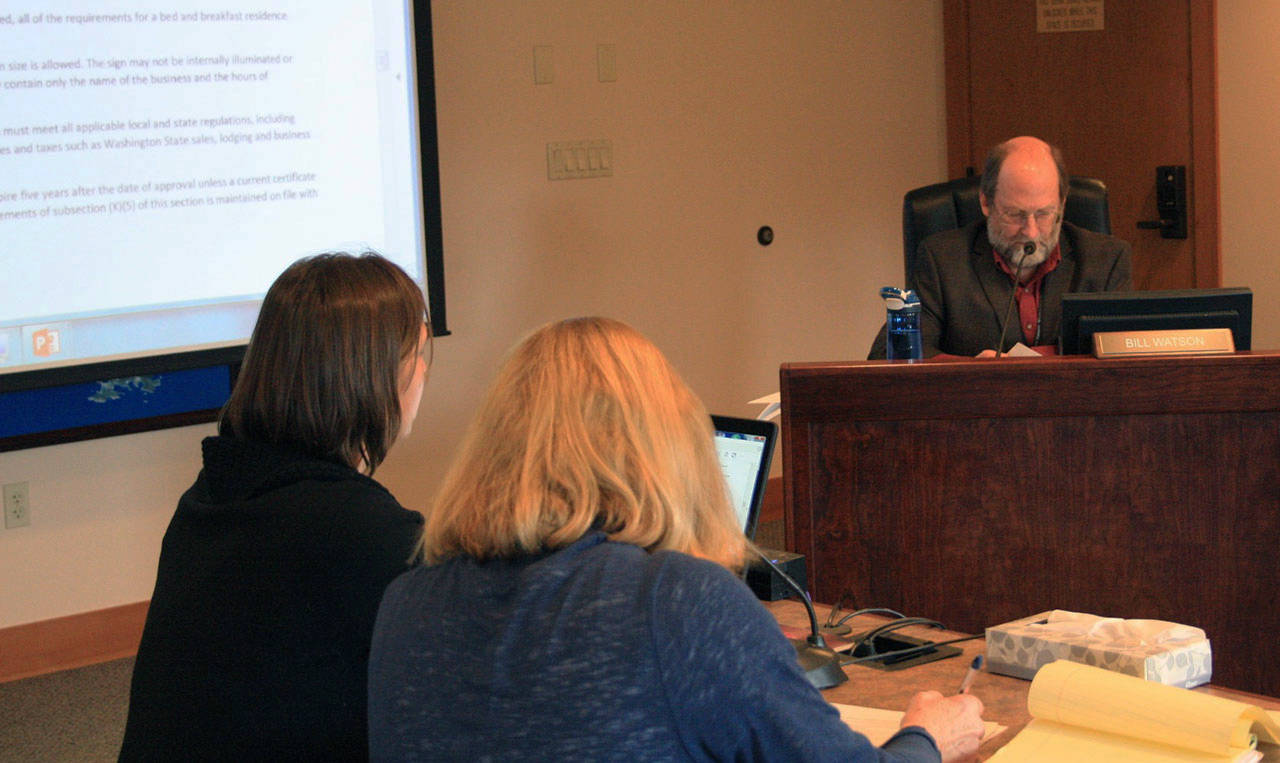County officials have questioned the correlation between vacation rentals and affordable housing since at least 2015. At the March 6 San Juan County Council meeting, proposed amendments to the county code’s vacation rentals ordinance were presented, in part, to fix that issue.
“If there are more requirements and compliance on a regular basis, people not interested or serious won’t apply for permits,” Erika Shook, director of San Juan County Community Development, told The Journal. Proposed amendments also address complaints, like excessive noise and limited parking, submitted by vacation rentals’ neighbors.
The proposed amendments will be presented to the county planning commission on March 17, with a tentative hearing on April 21, and sent back to the county council sometime in May. Public comment on the issue is open through April 20.
According to Shook’s presentation, of the 13,619 housing units and 7,708 households in the county, 7 percent are vacation rentals, 16 percent are renter-occupied, 36 percent are vacant homes and 41 percent are owner-occupied.
In 2000, there were 275 vacation rental permits in the county and in 2015, there were 964. From 2010 to 2015, 293 vacation rental permits were added to the county, while 52 long-term rentals and 82 vacant housing units were lost. Were some of those rentals and houses used for vacation rentals? That’s a question the county can’t answer based on data.
“Our housing market and our long-term rental housing market are so tight; even though vacation rentals are not a huge percentage, it’s impacting affordable housing, but maybe not as much as people think,” said Shook. “Vacation rentals are one contributing factor.”
County permits are not needed for rentals over 31 days.
The county’s draft affordable housing strategic plan, presented to the council in January, also lists regulating vacation rentals as a way to increase affordability and availability of houses in the county, according to Mark Tompkins, director of the San Juan County Health and Community Services. The Housing Bank Commission was one of 15 organizations, including the council, OPAL, Island Market, Kings Market, San Juan Island School District and Department of Community Development, who participated in the draft.
In 2015, council asked the Housing Bank Commission to report on whether an increase in vacation rentals impacted affordable housing availability countywide, but commissioners did not create one. Shook’s report at the March 6 meeting is the most recent county report on that issue.
The vacation rental ordinance’s proposed changes clean up the original 1998 code — which was last amended in 2006.
In the proposed code, vacation rental permits would be required to be renewed every five years, while currently they do not expire.
“We give them a permit and they are good forever,” said Shook to council about the current code.
Property owners would also have to create a management plan with the county and neighbors located within 300 feet. This is currently required for each property, but not written in the code. It would include requirements for annual fire and life safety certificates, like requiring smoke alarms and clear fire exits. County officials would require the 925 existing owners of vacation rental permits to update their permits to the new code, with inspections, tentatively by Dec. 31, 2018.
The management plan would also include enforcing the requirement of permit numbers in advertising, like on Airbnb, to allow county officials to locate unpermitted vacation rentals more easily. Searching for them without permit numbers takes about 20 minutes, said Shook.
Instead of retroactively fixing issues by investigating reported complaints, Shook recommended that county officials actively search for and enforce permit violations. Councilman Rick Hughes noted that property owners who do not have vacation rental permits cannot be traced to see if they are paying the state lodging tax, which partially goes back to the county.
Property owners with vacation rental permits that do not meet the code would be penalized by having permits revoked. Those with rentals without permits would be charged fees.
Shook said current vacation rental owners would be mailed requirements for the code updates if the amendments pass. Reminders to renew permits and fire and life safety licenses may be mailed as well. Other changes to the code include:
• Defining the original ordinance’s “unreasonable disturbances.” These include preventing trespassing, noise between 10 p.m. and 8 a.m., and speed limits no higher than 20 mph on paved roads and 15 mph on unpaved roads.
• Requiring one off-street parking space per bedroom. Previous code added one additional spot to the amount required by the county’s parking code, based on the number of bedrooms per house. This could possibly increase spots for houses with more than three bedrooms, said Shook.
• Adding rules about solid waste. This update would require waste to be collected weekly and to be hidden from neighbors’ view.
• Decreasing the guests allowed, per bedroom, from three to two to comply with septic system requirements.
Next week’s edition will include more on affordable housing, including a March 13 forum on the topic, held by the League of Women Voters of the San Juans.



